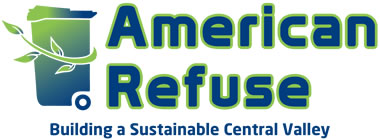Laws
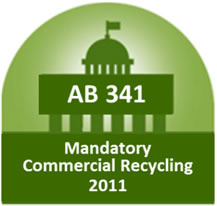
AB 341 “Mandatory Commercial Recycling”| Assembly Bill 341 went into effect July 1, 2012 to increase the amount of material diverted from landfills from the commercial sector.
Who is affected? Businesses that generate four (4) cubic yards or more of commercial solid waste per week shall arrange for recycling services. The same requirement is also applied to multifamily dwellings of five units or more.
The purpose of AB 341 is to reduce greenhouse gas (GHG) emissions by diverting commercial solid waste to recycling efforts and to expand the opportunity for additional recycling services and recycling manufacturing facilities in California. The AB 341 the focus has been on dry recyclables such as cardboard, paper fiber, pallets, rigid plastics, and containers. Cardboard and paper fiber recycling offer the highest methane mitigation potential per ton recycled, and can also count towards the efforts of SB 1383 compliance.
Cal Recycle http://www.calrecycle.ca.gov/recycle/commercial/
Requirements of Local Government: Each jurisdiction shall implement a commercial solid waste recycling program that consists of education, outreach, and monitoring of businesses that is appropriate for that jurisdiction and is designed to divert commercial solid waste from businesses. These jurisdictions shall report the progress achieved in implementing its commercial recycling program, including education, outreach and monitoring, and if applicable, enforcement efforts and exemptions, by providing updates in its electronic annual report.
Enforcement: CalRecycle will review each jurisdiction’s commercial recycling program that consists of education, outreach and monitoring. This will include an evaluation as part of its formal AB 939 review. Which includes each jurisdiction’s programs. Included in the review is an annual jurisdiction site visit, review of the Electronic Annual Report, and other information a jurisdiction may deem relevant.
If the jurisdiction is found to have not made a good-faith effort in implementing its programs, possibly including its mandatory commercial recycling program, CalRecycle can place the jurisdiction on a compliance order as part of the AB 939 review, and if it then fails to adequately meet the conditions of the compliance order, then CalRecycle could consider a penalty hearing.
American Refuse is fully equipped to help in meeting these goals for businesses and cities. We offer a variety of recycling options to help obtain compliance and diversion goals. We work closely with our sister company Carousel Recycling where items once thrown into landfills can now be recycled. Diversion reports can be easily obtained through our software specifically designed for the waste industry. Annual diversion reports as well as customer compliance can all be tracked and reported. We offer educational programs in schools, civic clubs, and business owners with our recycling coordinator.
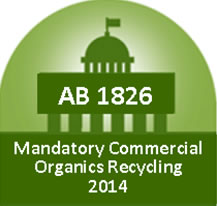 AB 1826 “Mandatory Commercial Organics Recycling” | Assembly Bill 1826 went into effect April 1,2016 requiring businesses to recycle their organic waste depending on the amount of waste they generate per week.
AB 1826 “Mandatory Commercial Organics Recycling” | Assembly Bill 1826 went into effect April 1,2016 requiring businesses to recycle their organic waste depending on the amount of waste they generate per week.
Who is affected? Businesses or Multifamily units with five (5) or more units who generate more than two (2) cubic yards of TRASH a week. The goal of the bill is to divert 50% of organics disposal from commercial businesses by 2020 as compared to 2014. The law changed in January of 2019 from four (4) cubic yards of organics to 4 cubic yards of trash per week. As of September 2020, Cal Recycle has dropped the cubic yardage from (4) to (2) cubic yards of trash per week.
*(note mulit-family does not require a “food waste” program).
Organic waste can be defined as the following materials: food waste, green waste, landscaping, pruning waste, non-hazardous food waste, food soiled paper mixed with food; other “organic” material.
The intended purpose of AB 1826 is to help reduce greenhouse gas (GHG) emissions by diverting organic waste to recycling efforts. It is estimated that 30 million tons of waste goes into our landfills a year. When organics are left to decompose on their own they are a source of emissions contributing to green house gases. When recycled through anaerobic digestion they become a renewable energy and fuel source. Organics can also be used in composting and mulching for our farm lands.
Cal Recycle http://www.calrecycle.ca.gov/recycle/commercial/organics/
Requirements of Local Government: Local jurisdictions must have an Organic Waste Recycling Program in place. Jurisdictions must identify regulated businesses and multi- family units. Conduct outreach and education to inform those businesses how to recycle organic waste, monitor to identify those not recycling, and inform them of the law and how to recycle organic waste. By August 1, 2017 Jurisdictions must provide information about their Organic Waste Recycling Program implementation in the annual report submitted to CalRecycle
Enforcement: After receipt of the 2017 annual reports submitted CalRecycle shall conduct its formal review of those jurisdictions that are on a two-year review cycle. On or after January 1, 2020, if CalRecycle determines that the statewide disposal of organic waste has not been reduced by 50% of the level of disposal in 2014, the organic recycling requirements on businesses will expand to cover businesses that generate 2 cubic yards or more of commercial solid waste per week. Additionally, certain exemptions may no longer be available if the 2020 target is not met. After receipt of the 2019 annual reports submitted on August 1, 2020, CalRecycle shall conduct its formal review of all jurisdictions. CalRecycle will continue to conduct the two- and four-year reviews after this cycle.
American Refuse can assist businesses and multifamily dwellings with education and proper containers for organics recycling. Our staff can help identify businesses who may need assistance and come up with a program to achieve compliance. Education and monitoring is the key to success. Our software can also assist in reporting to Cal Recycle for annual reports. American Refuse is partnering with other companies to help reduce and re-use food waste.

How Organics Legislation Works Together

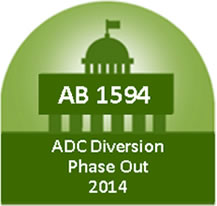 AB 1594 “Green Waste ADC Phase-out of Diversion Credits”| Assembly Bill 1594 states that as of January 1, 2020, the use of green material as alternative daily cover (ADC) would not constitute diversion through recycling and would be considered disposal for purposes of the act.
AB 1594 “Green Waste ADC Phase-out of Diversion Credits”| Assembly Bill 1594 states that as of January 1, 2020, the use of green material as alternative daily cover (ADC) would not constitute diversion through recycling and would be considered disposal for purposes of the act.
Who is affected? Local Jurisdictions must divert green material that was once used as ADC Alternate Daily Cover.
Requirements of Local Government: Local jurisdiction to include information in an annual report on how the local jurisdiction intends to address these diversion requirements and divert green material that is being used as ADC. The bill would require a jurisdiction that does not meet certain diversion requirements because of not being able to claim diversion for the use of green material as ADC to identify and address, in an annual report, barriers to recycling green material and, if sufficient capacity at facilities that recycle green material is not expected to be operational before a certain date, to include a plan to address those barriers. The bill would impose a state-mandated local program by imposing new duties upon local agencies regarding the diversion of solid waste.
Cal Recycle http://www.calrecycle.ca.gov/lgcentral/basics/ADCGreen/default.htm
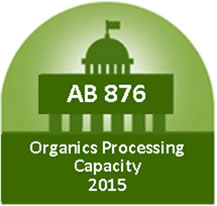 AB 876 “15-Year Organic Processing Capacity”| Assembly Bill 876 was passed in 2015 and compliments AB 1826. Beginning August 1, 2017 it will be required that an estimate of the amount of organics generated by each city over a 15 year period be included in their annual report to Cal Recycle. In addition, it calls for an estimate of the additional organic waste capacity that will be needed to process that amount of waste, and areas identified by the County or regional agencies as potential locations for new or expanded organic waste recycling facilities capable of safely meeting that additional need
AB 876 “15-Year Organic Processing Capacity”| Assembly Bill 876 was passed in 2015 and compliments AB 1826. Beginning August 1, 2017 it will be required that an estimate of the amount of organics generated by each city over a 15 year period be included in their annual report to Cal Recycle. In addition, it calls for an estimate of the additional organic waste capacity that will be needed to process that amount of waste, and areas identified by the County or regional agencies as potential locations for new or expanded organic waste recycling facilities capable of safely meeting that additional need
Who is affected? Cities, counties and regional agencies
Cal Recycle http://www.calrecycle.ca.gov/lgcentral/AnnualReport/OrganicInfra.htm
American Refuse has prepared the AB 876 Organic Waste Recycling Plan providing 15-years of organic waste generation and demonstrating 15-years of organic waste processing capacity at Kern County facilities.
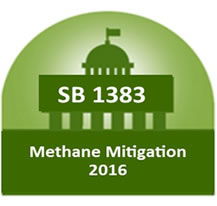 SB 1383 “Organics Reduction for Methane Mitigation”| The recently adopted Senate Bill 1383 has identified the reduction of methane generation of organic waste as a prioritized climate change mitigation strategy. As such, SB 1383 mandates reductions in the landfilling of organic waste, and thereby methane emissions. Whereas AB 341 and AB 1826 placed the burden of mandatory collection on the generators with a local government planning effort, SB 1383 explicitly shares the responsibility with local government where CalRecycle may add fines and penalties much like AB 939, but with delayed enforcement until 2024. SB 1383 requires CalRecycle, in consultation with CARB, to adopt regulations that achieve the specified targets for reducing organic waste in landfills by 2022. SB 1383 would authorize local jurisdictions to charge and collect fees to recover the local jurisdiction’s costs incurred in complying with the regulations.
SB 1383 “Organics Reduction for Methane Mitigation”| The recently adopted Senate Bill 1383 has identified the reduction of methane generation of organic waste as a prioritized climate change mitigation strategy. As such, SB 1383 mandates reductions in the landfilling of organic waste, and thereby methane emissions. Whereas AB 341 and AB 1826 placed the burden of mandatory collection on the generators with a local government planning effort, SB 1383 explicitly shares the responsibility with local government where CalRecycle may add fines and penalties much like AB 939, but with delayed enforcement until 2024. SB 1383 requires CalRecycle, in consultation with CARB, to adopt regulations that achieve the specified targets for reducing organic waste in landfills by 2022. SB 1383 would authorize local jurisdictions to charge and collect fees to recover the local jurisdiction’s costs incurred in complying with the regulations.
SB 1383 would require by July 1, 2020, for CalRecycle to analyze the progress that the waste sector, state government, and local governments have made in achieving the specified targets for reducing organic waste in landfills such as infrastructure development and markets for products. SB 1383 would authorize CalRecycle, depending on the outcome of that analysis, to amend the regulations to include incentives or additional requirements. The regulations shall also include requirements intended to meet the goal that not less than 20% of edible food that is currently disposed of is recovered for human consumption by 2025.
Cal Recycle http://www.calrecycle.ca.gov/Climate/SLCP/
Specifically, this bill adds two goals for organic waste disposal reductions:
- A 50% reduction in the level of statewide disposal of organic waste from the 2014 level by 2020.
- A 75% reduction in the level of statewide disposal of organic waste from the 2014 level by 2025.
In 2020, the analysis will include:
- Status of new organics recycling infrastructure development, including the commitment of state funding and appropriate rate increases for solid waste and recycling services to support infrastructure expansion.
- Progress made in reducing barriers to the siting of organics recycling facilities and the timing and effectiveness of policies that will facilitate the permitting of organic’s recycling infrastructure.
- Status of markets for the products generated by organics recycling facilities.
The purpose of SB 1383 is to reduce methane by diverting organic waste from landfilling. SB 1383 regulations will be published during 2017 and 2018, where the types of organic waste will be further identified. AB 341 has been focused on dry recyclables such as cardboard, paper fiber, pallets, rigid plastics, and containers, with food waste and compostable paper being the focus of AB 1826. Cardboard and paper fiber recycling offer the highest methane mitigation potential per ton recycled and are part of the current mandatory commercial recycling program. AB 1826 with SB 1383 will focus on food waste, compostable paper, green waste and wood waste.
American Refuse prepared the SB 1383 Organic Waste Recycling Plan providing tonnage targets to 2025 and programs to achieve compliance.
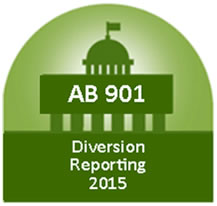 AB 901 “Reporting Requirements”| Assembly Bill 901, which was passed in 2015, will require exporters, brokers, and transporters of recyclables or composters to submit periodic information to CalRecycle on the types, quantities, and destinations of materials that are disposed of, sold, or transferred inside or outside of the state, and would authorize the department to provide this information, on an aggregated basis, to jurisdictions, as specified. The regulations will be published during 2017, and will start on January 1, 2018. Cities will be required to track the organics tons being transferred into the marketplace on a quarterly basis and report those tons to CalRecycle.
AB 901 “Reporting Requirements”| Assembly Bill 901, which was passed in 2015, will require exporters, brokers, and transporters of recyclables or composters to submit periodic information to CalRecycle on the types, quantities, and destinations of materials that are disposed of, sold, or transferred inside or outside of the state, and would authorize the department to provide this information, on an aggregated basis, to jurisdictions, as specified. The regulations will be published during 2017, and will start on January 1, 2018. Cities will be required to track the organics tons being transferred into the marketplace on a quarterly basis and report those tons to CalRecycle.
Cal Recycle http://www.calrecycle.ca.gov/Laws/Rulemaking/Reporting/default.htm
AB 1103 (Dodd, 2016) will require generators that self-haul more than one cubic yard per week of its own food waste to a location or facility not owned or operated by the entity will need to report those tons to CalRecycle, and this law may dovetail with AB 901 regulations.
SB 498 (Lara, 2014) requires the biomass conversion facility operators to provide an annual report to CalRecycle about the source of each type of material accepted by the facility, which means that wood chips going from a chipping and grinding to bioenergy must be reported starting 2016.
American Refuse can offer monitoring and provide reports that will be able to comply with AB 901 starting 2018 which require commodity reporting, and provide critical information to the cities that will be part of their Annual Report each August 1, to submit to CalRecycle to show compliance with AB 341, AB 1826, and SB 1383.
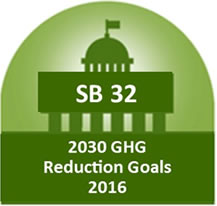 SB 32 “2030 GHG Reduction Goals”| The California Global Warming Solutions Act of 2006, known as SB 32, designates the California Air Resources Board (CARB) as the state agency charged with monitoring and regulating sources of emissions of greenhouse gases. CARB is required to approve a statewide greenhouse gas emissions limit equivalent to the statewide greenhouse gas emissions level in 1990 to be achieved by 2020 and to adopt rules and regulations in an open public process to achieve the maximum, technologically feasible, and cost-effective greenhouse gas emissions reductions. California is on track to meet the AB 32 goals in 2020. SB 32 would require CARB to ensure that statewide greenhouse gas emissions are reduced to 40% below the 1990 level by 2030. CARB will be preparing the 2030 Target Scoping Plan in 2017 that will integrate SB 1383 and the AB 32 Scoping Plan adopted in 2014 to meet the SB 32 goals and has included a local implementation section that recognizes the importance of local climate action plans.
SB 32 “2030 GHG Reduction Goals”| The California Global Warming Solutions Act of 2006, known as SB 32, designates the California Air Resources Board (CARB) as the state agency charged with monitoring and regulating sources of emissions of greenhouse gases. CARB is required to approve a statewide greenhouse gas emissions limit equivalent to the statewide greenhouse gas emissions level in 1990 to be achieved by 2020 and to adopt rules and regulations in an open public process to achieve the maximum, technologically feasible, and cost-effective greenhouse gas emissions reductions. California is on track to meet the AB 32 goals in 2020. SB 32 would require CARB to ensure that statewide greenhouse gas emissions are reduced to 40% below the 1990 level by 2030. CARB will be preparing the 2030 Target Scoping Plan in 2017 that will integrate SB 1383 and the AB 32 Scoping Plan adopted in 2014 to meet the SB 32 goals and has included a local implementation section that recognizes the importance of local climate action plans.
Cal Recycle http://www.calrecycle.ca.gov/Climate/SLCP/
American Refuse is offering programs that will result in avoided greenhouse gas and have calculated that the cities would reduce their greenhouse gases by over 50% in transportation emissions resulting from recycling by having a local recycling facility and not hauling materials to Bakersfield. American Refuse’s sister company, Carousel Recycling, is a MRF transfer station serving Northern Kern County
